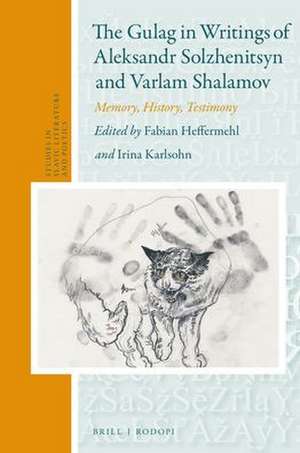The Gulag in Writings of Aleksandr Solzhenitsyn and Varlam Shalamov: Memory, History, Testimony: Studies in Slavic Literature and Poetics, cartea 63
Fabian Heffermehl, Irina Karlsohnen Limba Engleză Hardback – 18 aug 2021
Contributors: Andrea Gullotta, Fabian Heffermehl, Luba Jurgenson, Irina Karlsohn, Josefina Lundblad-Janjić, Elena Mikhailik, Michael A. Nicholson, Irina Sandomirskaja, Ulrich Schmid, Franziska Thun-Hohenstein, Leona Toker.
Preț: 565.92 lei
Preț vechi: 690.14 lei
-18% Nou
Puncte Express: 849
Preț estimativ în valută:
108.29€ • 113.44$ • 89.75£
108.29€ • 113.44$ • 89.75£
Carte indisponibilă temporar
Doresc să fiu notificat când acest titlu va fi disponibil:
Se trimite...
Preluare comenzi: 021 569.72.76
Specificații
ISBN-13: 9789004468450
ISBN-10: 9004468455
Dimensiuni: 155 x 235 mm
Greutate: 0 kg
Editura: Brill
Colecția Brill
Seria Studies in Slavic Literature and Poetics
ISBN-10: 9004468455
Dimensiuni: 155 x 235 mm
Greutate: 0 kg
Editura: Brill
Colecția Brill
Seria Studies in Slavic Literature and Poetics
Cuprins
Content
Acknowledgements
Notes on Contributors
Introduction Fabian Heffermehl and Irina Karlsohn
Part 1 Literary Origins
1 Discontinuities in the Evolution of Kolyma Stories and “One Day in the Life of Ivan Denisovich” Michael A. Nicholson
2 Poetry after the Gulag: Do Solzhenitsyn and Shalamov Have a Lyric Mindset? Ulrich Schmid
3 More than a Cat: Reflections on Shalamov’s and Solzhenitsyn’s Writings through the Perspective of Trauma Studies Andrea Gullotta
Part 2 Memory and Body
4 Why Did Solzhenitsyn and Shalamov Not Write The Gulag Archipelago Together? Luba Jurgenson
5 Tactility and Memory in Shalamov Fabian Heffermehl
6 “A Grudge-holding Body”: Body and Memory in the Works of Varlam Shalamov Franziska Thun-Hohenstein
7 Certain Properties of Rhyme: Poetic Language Touching Abomination Irina Sandomirskaia
Part 3 History and Narrative
8 Counterfactuals and History in The Gulag Archipelago Irina Karlsohn
9 “The Gulag’s Archipelago”: Rhetoric of History Elena Mikhailik
10 Telling the Stories of Others and Writing the Bodies of Others: The Representation of Women in Shalamov’s Kolyma Stories and Solzhenitsyn’s The Gulag Archipelago Josefina Lundblad-Janjić
11 The Issue of “Softening” and the Problem of Addressivity in Solzhenitsyn and Shalamov Leona Toker
Index
Acknowledgements
Notes on Contributors
Introduction Fabian Heffermehl and Irina Karlsohn
Part 1 Literary Origins
1 Discontinuities in the Evolution of Kolyma Stories and “One Day in the Life of Ivan Denisovich” Michael A. Nicholson
2 Poetry after the Gulag: Do Solzhenitsyn and Shalamov Have a Lyric Mindset? Ulrich Schmid
3 More than a Cat: Reflections on Shalamov’s and Solzhenitsyn’s Writings through the Perspective of Trauma Studies Andrea Gullotta
Part 2 Memory and Body
4 Why Did Solzhenitsyn and Shalamov Not Write The Gulag Archipelago Together? Luba Jurgenson
5 Tactility and Memory in Shalamov Fabian Heffermehl
6 “A Grudge-holding Body”: Body and Memory in the Works of Varlam Shalamov Franziska Thun-Hohenstein
7 Certain Properties of Rhyme: Poetic Language Touching Abomination Irina Sandomirskaia
Part 3 History and Narrative
8 Counterfactuals and History in The Gulag Archipelago Irina Karlsohn
9 “The Gulag’s Archipelago”: Rhetoric of History Elena Mikhailik
10 Telling the Stories of Others and Writing the Bodies of Others: The Representation of Women in Shalamov’s Kolyma Stories and Solzhenitsyn’s The Gulag Archipelago Josefina Lundblad-Janjić
11 The Issue of “Softening” and the Problem of Addressivity in Solzhenitsyn and Shalamov Leona Toker
Index
Notă biografică
Fabian Heffermehl, Ph.D, University of Oslo / Humboldt University of Berlin, is researcher in art theory and Russian literature.
Irina Karlsohn, Ph.D, is Senior Lecturer of Russian language and literature at Dalarna University, Sweden.
Irina Karlsohn, Ph.D, is Senior Lecturer of Russian language and literature at Dalarna University, Sweden.









